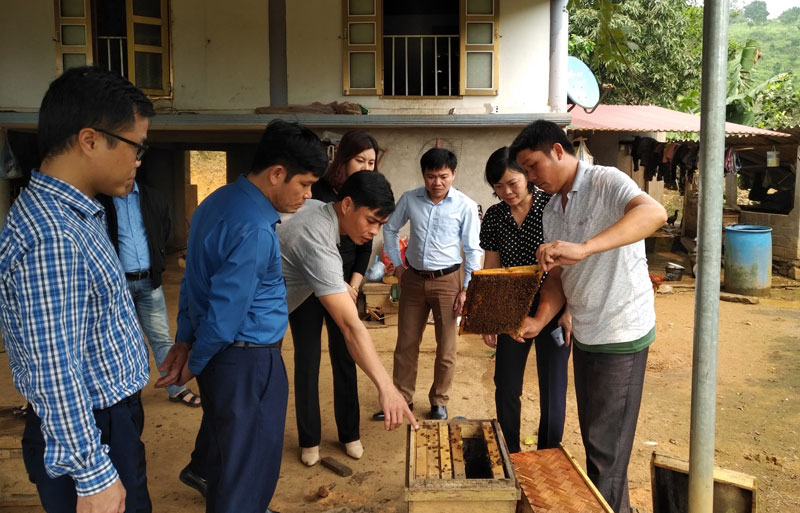
(HBO) – Phase II of the Forest and Farm Facility (FFF) programme has been carried out by Hoa Binh province Farmers’ Association since 2019. It aims to raise capacity of forest growers, families, women, youths and people of ethnic minority groups, facilitating poverty reduction and climate change adaptation.

Officers of the
provincial Farmers’ Association survey, assess a beekeeping model in Phase II of
the FFF programme in Tu Ne commune (Tan Lac district).
The association surveyed and decided to implement the
programme in An Binh commune (Lac Thuy district) and the communes of Dong Lai
and Tu Ne (Tan Lac district). Its project management board joined hands with local
authorities and Farmers’ Associations of districts and communes to set up key
groups at the communal level.
Training courses were arranged for members of the groups to
improve their skills and promote understanding of teamwork’s benefits, in a bid
to develop forests and farms along with keeping with environmental protection.
They were hoped to help women, youths and people of ethnic
minority groups in sustainable production of agro-forestry-fishery goods,
raising values of forests and improving landscapes and income.
The Muong Cu forest growing and beekeeping group in Cu
village of Tu Ne commune is said to be among the most effective models operated
by farmers. At present, 20 farmer households join the group, keeping a total of
600 colonies of honey bee.
Through the FFF programme, members were able to take part in
training courses in beekeeping, business skills and policy dissemination, among
others.
After one year of implementation, Phase II of the FFF programme
has seen initial results, creating a driving force for the community and
farmers to continue activities in the forest-based sector.
Three cooperatives have been set up and run effectively,
generating jobs for local workers.
The programme also facilitated the establishment of two
groups on beekeeping and growing citrus trees in Tu Ne commune, a group on
organic pomelo cultivation in Dong Lai commune (Tan Lac ditrict) and a model of
raising chickens in An Binh commune (Lac Thuy).
Products of the groups and cooperatives are shipped to various
markets with stable prices. Tens of local workhands earn stable jobs with an
average monthly income of 5 million VND (215 USD)./.
The Standing Board of the Hoa Binh provincial Party Committee has agreed in principle on a proposal by the Standing Board of the Party Committee of Hoa Binh city to gather feedback on the city’s 1:2000 zoning plan, which forms part of its broader urban development strategy.
Hoa Binh province has made notable progress in public administration reform and digital government development, with the satisfaction index among citizens and businesses reaching over 84%, according to recent government evaluations.
Thanks to great efforts by local authorities in recent times, the governance and public administration performance of Mai Chau district has been significantly improved.
In the afternoon of June 6, the Party Committee, the People's Council, the People's Committee and the Fatherland Front of Lac Son district solemnly held a meeting to celebrate the 139th anniversary of the district's founding (1886–2025) and the 79th anniversary of the establishment of the district's Party Committee (1946–2025). There was the attendance of Mr. Bui Van Thang, the Vice Chairman of the Provincial People's Council; Mr. Quach Tat Liem, the Vice Chairman of the Provincial People's Committee; Ms. Dang Bich Ngoc, the Deputy Head of the National Assembly Delegation of the province; as well as the former leaders of the province and district through various periods, who are the natives of the district.
Implementing the Politburo’s Resolution No. 57-NQ/TW on breakthroughs in science – technology, innovation, and digital transformation is a golden opportunity for the northern mountainous province of Hoa Binh to renew growth model, improve competitive edge and shorten digital gap.
Resolution 57-NQ/TW, issued by the Politburo on December 22, 2024, identifies sci-tech, innovation, and digital transformation as strategic breakthroughs to build a developed and prosperous nation. In Hoa Binh province, this spirit is not just a slogan, it’s being put into action through concrete initiatives that form a "new development triangle”: digital citizenship, digital economy, and digital administration.



